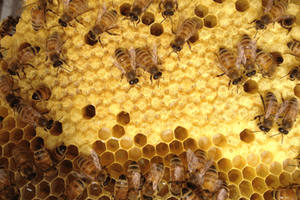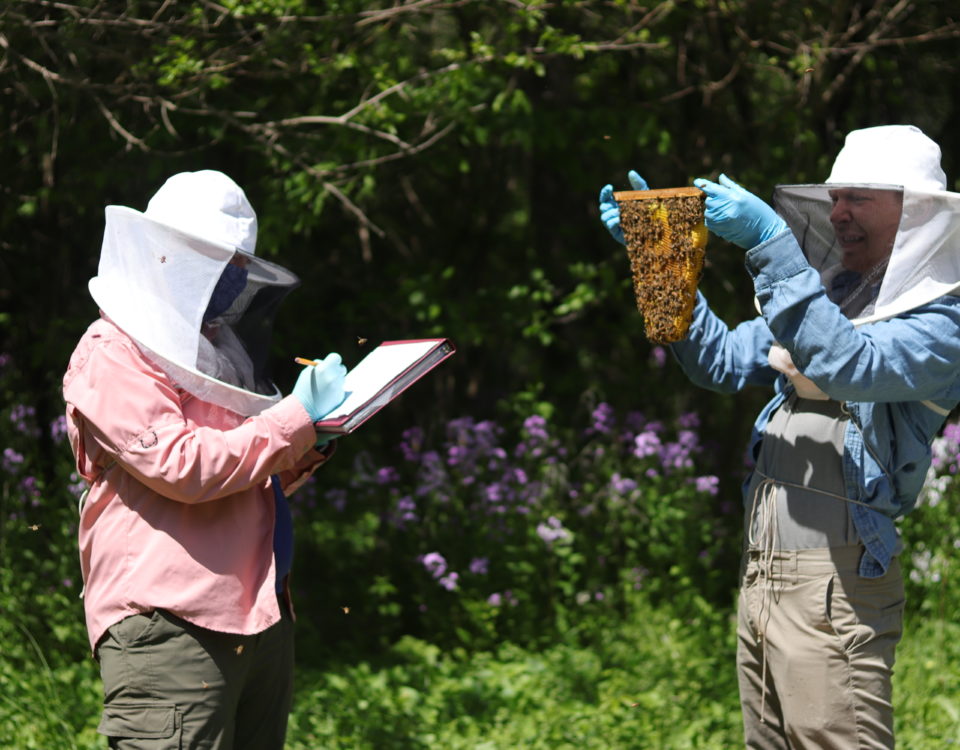- All-In-One Beekeeping for the Bees
- +1-608-728-8233
- info@beepods.com
The Real Meaning Behind “Busy Bees”

This lady is was so busy foraging, she got pollen all over herself!
Worker bees – how busy are they? Unlike a human’s typical 9 to 5 business day, worker bees can work up to 12 hours in one day – and they never have a day off. When you look at a bee, your first thought is not about how busy they are – your first thought is probably that they are cute or scary if you are afraid of bees ( we will take care of that fear later)! But in reality, worker bees are always on the go.
A worker bee’s sole purpose for living is to work. From the moment they are born to the moment they die, they always have a job, a role to fill within the hive, and lives to protect. They work every single day without any days off – that is a lot of responsibility for one small bee.
Worker bees are quite literally the powerhouse of the hive. They are the engine that drives pollination, plant diversity, the growth of other bees and so much more. They go through multiple roles within the hive and outside of the hive as they age, and we are going to take you through their whole life cycle. Grab a seat, you may get tired even reading about their busy life!
Worker Housekeeper Bee
While many define the first role of a worker bee to be a nurse, we wanted to dive into their roles a bit deeper which brings us to the actual first role, a housekeeper. During this stage, a worker bee emerges from its cell and one of her first tasks is to clean the cell out. The purpose of this is so that these new cells are clean enough to receive other larva, pollen, or nectar. This role only lasts about 1-3 days on average. During this stage and into the first 1-2 weeks, worker bees will also clear out any bees that have died and dispose of them far away from the hive so no diseases they may carry impact the hive.
Nurse Bees
Like many other insects, the worker bee begins its journey as an egg that develops into larva. Many worker bees will hatch after only 3 short days and will immediately begin their journey. Once hatched, these bees will be fed royal jelly for a short period of time until they take on that role themselves to go feed other newly hatched larvae. On average, these nurse bees will check on their “sisters’ around 1300 times a day- how meaningful!
The Queen’s Personal Assistant
When finished with the nursing stage, these bees graduate to a higher job – attending to the queen. They will get to work and take on the job of processing nectar for other bees as well as cleaning out wax cells for the queen bee and grooming her. This role will last for about a week.
Packing, Sealing, and Fanning
Before they are allowed to forage, the younger worker bees around days 12-35 will do work for the bees that are foraging – organizing the hive if you will.
- Packing: Placing pollen from foraging honey bees and packing it into a cell
- Sealing: Drying and capping the pollen into the cell
- Fanning: Controlling the temperature of the hive (Essentially a personalized air condition unit for the hive). There are even jobs for worker bees to carry water to the fanners in order to keep the hive cool.
During these days, these worker bees are completing a variety of tasks before they can graduate to foraging – which consumes the majority of their life. At this stage, the worker bees make wax, build honeycomb, and repair damage to the hive. This role only lasts until the worker bees are three weeks old, and at that point they are ready to move on.
Foragers
Can you imagine working from dusk till dawn every single day for the rest of your life? When worker bees turn around three weeks old, their job changes to foraging for pollen, nectar, and water. They will travel up to six miles everyday to provide for the rest of their hive. This is probably their most important role, and it is definitely their most dangerous and tiring role. Worker bees will continue to forage until the weather gets too cold and they must resort to their winter time duties.

Winter Duty
During the winter, worker bees have one main job – to produce heat. Worker bees will gather in the center of the hive (brood) and vibrate their wings to produce heat. Unfortunately, if there is not enough honey to feed the bees or if temperatures drop too low, the bees could die off. Read more about winter time duties and safety precautions here.
Parting Thoughts
Worker bees are the backbone of any beehive. They have a number of essential tasks to perform, from collecting nectar and pollen for their colony’s food supply to taking care of eggs or larvae in order to keep them safe until they can become full fledged worker bees themselves. If you’re interested in learning more about what these little guys do day-to-day, there is plenty more research out there! We tried our best to cover some major duties here, but if you want an even better understanding before keeping your own hive.
Elizabeth Allon
Latest posts by Elizabeth Allon (see all)
- Short But Mighty: The Stages of Life - January 26, 2022
- Honey Bees Vs. Highways - January 19, 2022
- 4 Ways to Save The Bees in 2022 - January 12, 2022



